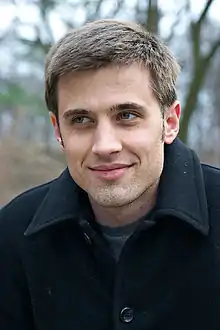Chad Johnson (physicist)
Chad Jeremy Johnson (born January 13, 1978) is an American particle physicist and noted photographer. He is best known for his work in the search for a neutral long-lived particle produced in decays of Higgs Boson. His work was primarily at the Fermilab Tevatron Collider in Batavia Illinois, from 2002 to 2008.
Chad J. Johnson | |
|---|---|
 | |
| Born | January 13, 1978 |
| Education | B.S. from University of Minnesota, PHD from Columbia University |
| Occupation | Physicist, photographer |
| Known for | Contributions to Particle Physics and Photography |
| Website | http://chadjohnsonphotography.com/ |
Education
Chad has a PhD in high energy particle physics from Columbia University. His undergraduate physics training was at the University of Minnesota, Twin Cities Campus. His work has been published in the American Physical Society Journal.[1]
Career
Physics
Johnson’s work was concentrated on the theoretical particle created in the decays of Higgs boson; specifically in collisions that decay to b-jets and the particle that lives long enough to travel at least 1.6 cm before decaying into heavy quarks.[2] The Higgs Boson is an elementary particle in the Standard Model of particle physics.[3] Its existence was discovered in 2012 by the ATLAS and CMS experiments at CERN's Large Hadron Collider.[4]
Johnson’s novel search for the unnamed particle is theorized to arise in the “hidden valley” sector of particle physics.[5] Johnson’s work involved mapping center-of-mass energy of 1.96TeV. Johnson worked with the DØ experiment, located at one of the interaction regions, where proton and antiproton beams intersect, on the Tevatron synchrotron ring, labeled 'DØ'.[2]
His recent work is in medical physics, in the radiation oncology department centered at Columbia Presbyterian Hospital. He is developing new technologies to improve the effectiveness of lasers to target and eradicate cancerous tissue.
Photography
Chad Johnson is also a New York based professional photographer, specializing in urban nightlife and celebrity portraits. His list of photography subjects include Lady Gaga and Maria Tash.[6] In 2012, he founded The Commercial Art Lab, which specializes in jewelry photography.[7] His work has been published in Elite Traveler, Rapaport, Marie Claire, New York Magazine, online French Vogue, and National Jeweler.[8]
References
- D0 Collaboration; Abazov, V. M.; Abbott, B.; Abolins, M.; Acharya, B. S.; Adams, M.; Adams, T.; Aguilo, E.; Ahsan, M. (2009). "Search for Next-to-Minimal Supersymmetric Higgs Bosons in the $h\ensuremath{\rightarrow}aa\ensuremath{\rightarrow}\ensuremath{\mu}\ensuremath{\mu}\ensuremath{\mu}\ensuremath{\mu}$, $\ensuremath{\mu}\ensuremath{\mu}\ensuremath{\tau}\ensuremath{\tau}$ Channels Using $p\overline{p}$ Collisions at $\sqrt{s}=1.96\text{ }\text{ }\mathrm{TeV}$". Physical Review Letters. 103 (6): 061801. arXiv:0905.3381. Bibcode:2009PhRvL.103f1801A. doi:10.1103/PhysRevLett.103.061801. PMID 19792550.
- "Search for a Neutral Long-Lived Particle Decaying to b-Jets" (PDF). Columbia University. Retrieved 2010-01-12.
- "The Higgs boson". CERN. CERN.
- Greene, Brian. "How the Higgs Boson Was Found". Smithsonian Magazine. Smithsonian Magazine.
- Abazov, V. M; Abbott, B; Abolins, M; Acharya, B. S; Adams, M; Adams, T; Aguilo, E; Ahsan, M; Alexeev, G. D; Alkhazov, G; Alton, A; Alverson, G; Alves, G. A; Ancu, L. S; Andeen, T; Anzelc, M. S; Aoki, M; Arnoud, Y; Arov, M; Arthaud, M; Askew, A; Åsman, B; Atramentov, O; Avila, C; Backusmayes, J; Badaud, F; Bagby, L; Baldin, B; Bandurin, D. V; et al. (2009). "Search for Next-to-Minimal Supersymmetric Higgs Bosons in the h→aa→μμμμ, μμττ Channels Using pp̅ Collisions at √s=1.96 TeV". Physical Review Letters. 103 (6): 061801. arXiv:0905.3381. Bibcode:2009PhRvL.103f1801A. doi:10.1103/PhysRevLett.103.061801. PMID 19792550.
- "Chad Johnson Photography". Archived from the original on 2009-10-13. Retrieved 2010-01-12.
- Johnson, Chad. "The Commercial Art Lab".
- Johnson, Chad. "The Commercial Art Lab". The Commercial Art Lab.